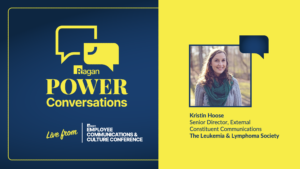Top takeaways from Ragan’s Employee Communications and Culture Conference
The conference took place April 16th -18th in the heart of Chicago at the Fairmont hotel.

Hundreds of comms pros gathered in downtown Chicago last week to learn about the tools they need to supersize their strategy, elevate their comms and of course forge some new friendships.
There was no shortage of knowledge sharing, whether it was from our esteemed speakers or a fellow industry peer. From strategies to help people leaders communicate with their teams effectively, to how to write and research using AI, it’s safe to say comms pros soaked it all in.
There were so many great lessons from the three-day event, but we’ve summed it up with the top takeaways.
Effective Comms Strategies
- “Yes, and” is the best way to unlock ideas and innovation. Second City’s Kelly Leonard advised that when you disagree with someone, saying “thank you, because” allows you to continue the conversation to get to middle ground and “replace blame with curiosity.”
- Being proactive in communications means more than just reacting. Danisha Hall, director of global enterprise and employee communications at McDonald’s, acknowledged that comms roles get a bit of flack for being reactive, but proactivity is building relationships, being embedded with leaders, and understanding their goals. We have the ability to connect the dots, and that’s very proactive.
Culture, Strategy, Leadership
- Culture trumps strategy. Meghan Boyer, head of internal communications, GE Healthcare, said that culture eats strategy for breakfast. You can have a great strategic approach but if they’re missing the culture and the feeling behind it, you’re going to lose your employees. They won’t feel like they work for a company that allows them to be themselves.
- “The cascade is real — but thawing the so-called ‘frozen middle’ means putting in briefings and providing resources that give managers enough forewarning to feel empowered and able to be ambassadors to your message,” said Carly Keeny, executive director of communications, technology, product and experience at Comcast.
- Partner with DE&I leads. Kristin Hoose, senior director, external constituent communications for the Leukemia and Lymphoma Society, advised us to “partner with DE&I leads to acknowledge that staff is supported when bad things happen in the world. This means leaning on ERG groups and creating a communications issues crisis response team.”
- Maintain clarity and focus amidst uncertainty. “We couldn’t tell people how to feel in the moment, but we wanted them to know what the plan of action was, and we were crystal clear on what needed to happen that day to make sure only the crucial messages went to the top,” said Brendan Smith-Bentley, head of internal communications, Silicon Valley Bank.
Storytelling
- “We’ve got to believe what we say, what we write. And if that’s not the case, let’s have a conversation about it,” said Andy Choi, head of communications at Verizon. If you’re doing this the right way you’re also asking the right questions and telling the right story the same way that journalists do.
- Effective storytelling requires guiding audiences. In our panel on mapping the employer journey, we learned that “We can’t just assume that everyone is at the same stage of understanding the story you’re trying to tell. Look at how you take your audiences from an educational state to tactical knowledge and strategic integration within a self-perpetuating model.”
- “Numbers help you speak the language of leaders. Tie in your results with strategic business goals.” said Christine de la Huerta, director of internal communications, marketing & communications at Baptist Health South Florida.
- Radical transparency and consistent and frequent updates about changes help her team forge ahead through crisis and catastrophe.
Employee Experience
- “We are allies to the employee experience. We are their voice, and we can own and control that.” said Nicole Neal, vice president, head of internal communications, Zurich North America.
- Kate Barton, chief growth officer for The Honest Company said, ”it’s either ‘hell yes!’ or ‘hell no!’ — and no assholes allowed!”
- Coca-Cola’s Vice President, Corporate Communications and Change Management Tricia Taylor taught us that comms can have a great Spotify playlist.
Isis Simpson-Mersha is a conference producer/ reporter for Ragan. Follow her on LinkedIn.







